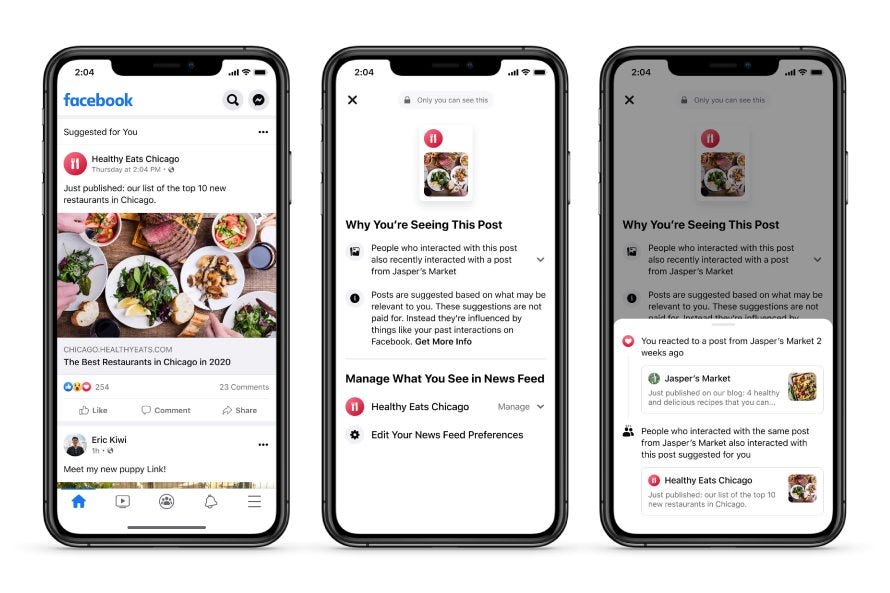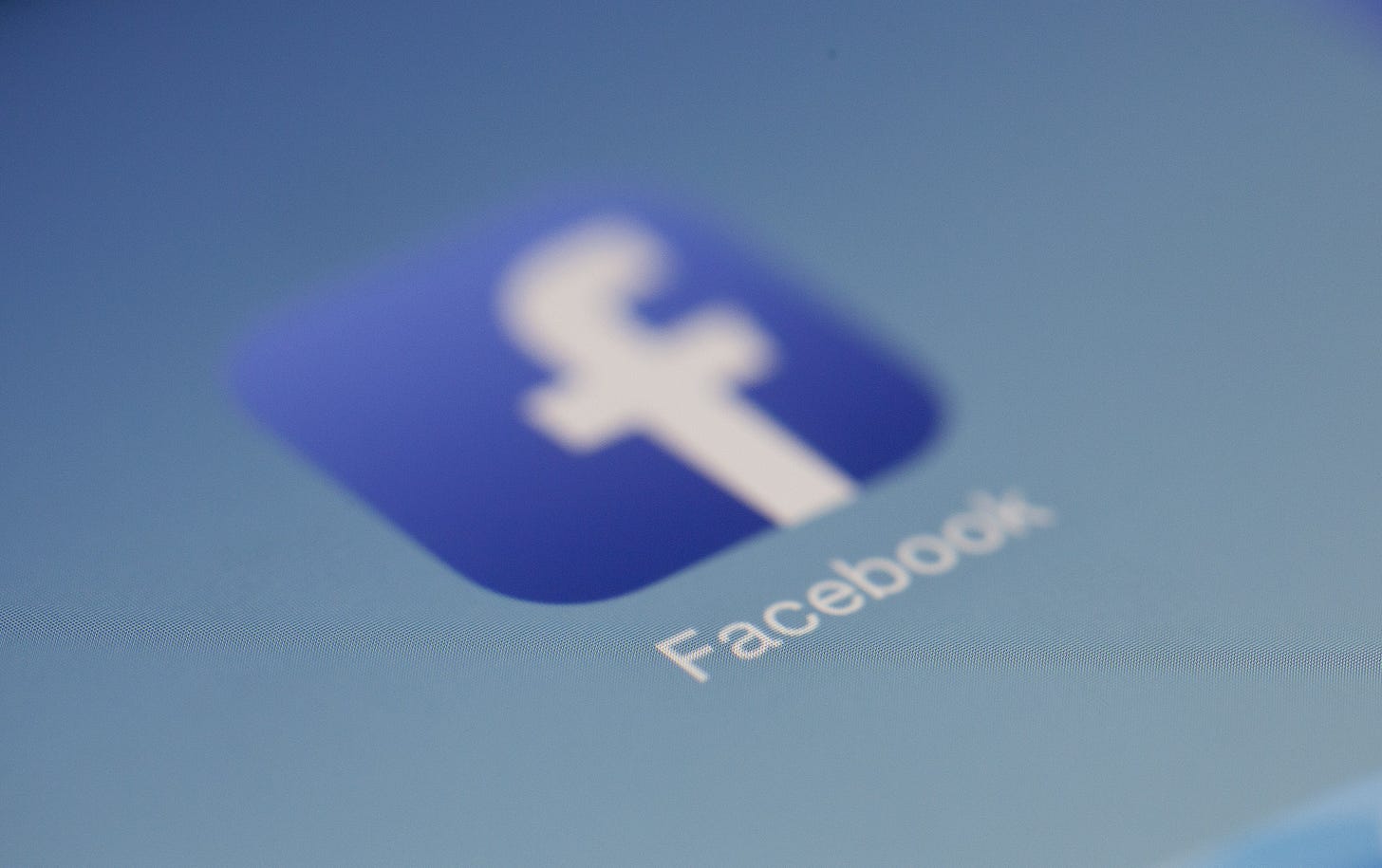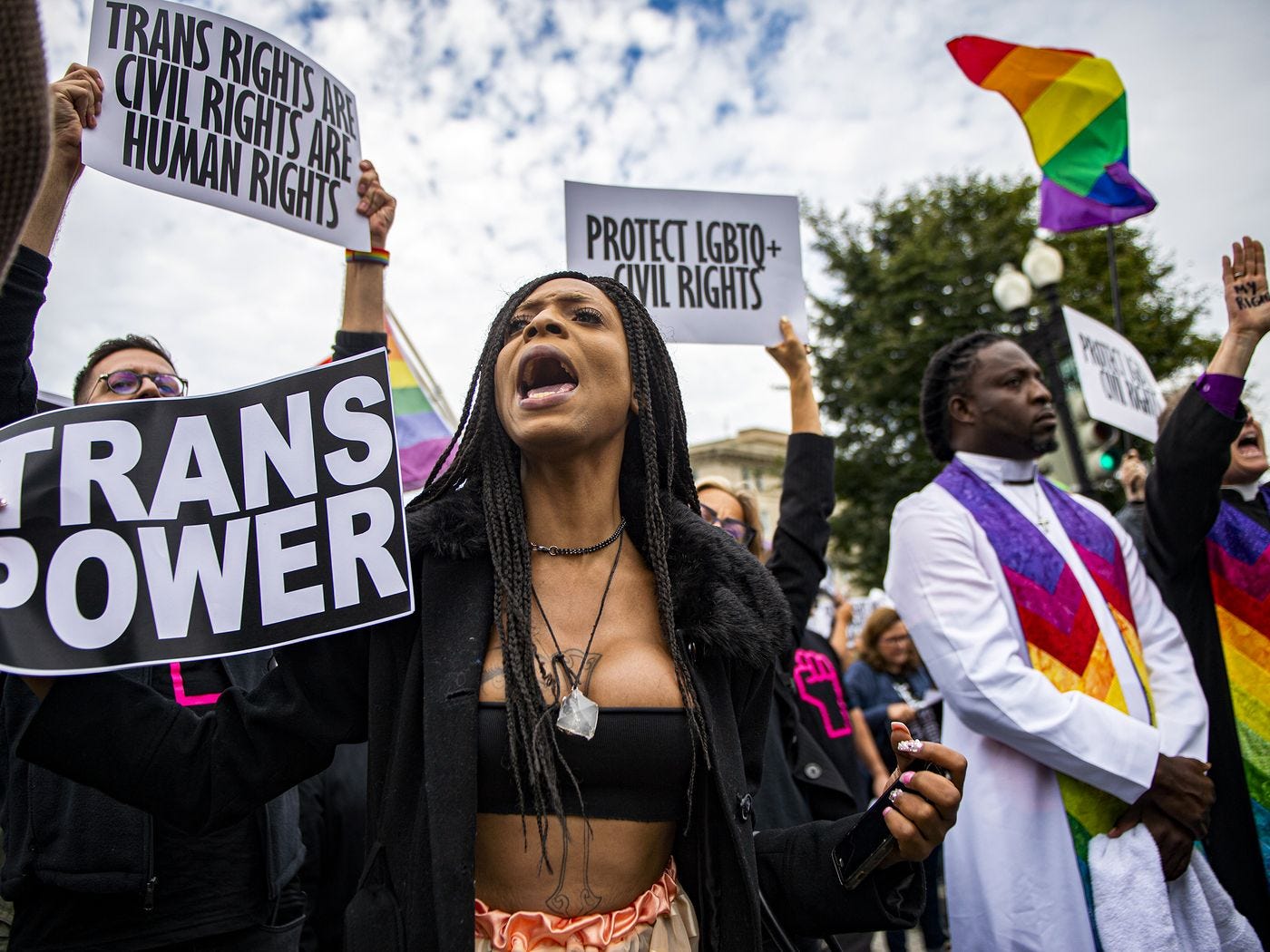Facebook turns the spotlight from its algorithm to you
The company’s new “Feed Filter” is its latest attempt to skirt accountability for the content it shows you.
Facebook dominated headlines today with its launch of “Feed Filter,” a new feature that turns off its algorithmically ranked News Feed and instead enables you quick access to a new “Most Recent” setting. This configuration will only show you posts from friends, Pages and groups in the order they were posted. It also enables you to update your Favorites and see more of your preferred friends’ content or temporarily hide posts (aka “snooze”) posts from a person, Page or group, similar to the muting feature on Twitter.
That’s not all: You’ll also be able to limit comments on your public posts to friends or profiles you’ve tagged. The company is also expanding the “Why am I seeing this?” feature to show you additional info when you tap on recommended content and help you avoid seeing posts you dislike. “The goal of the News Feed is to connect you to what matters most to you: the people in your life, interesting content and the world around you,” Facebook said in a blog post announcing the new feature. “The friends you add, the Pages you like, the groups you join and the things you interact with all shape how your News Feed looks on any given day.” Josh Taylor at The Guardian reports this feature is a response to a 2019 landmark ruling in Australia that said news organizations were liable for defamatory comments posted by users on the companies’ public Facebook pages. But until now, there was no way to pre-screen comments unless the page admins used a keyword filter that would prevent comments containing certain words or phrases from being posted.
In the past year, FB has received scrutiny from critics — including yours truly — who feel that its algorithms enable them to editorialize (or, as they say, personalize) the media it presents to users while enjoying protections that media organizations are excluded from. Feed Filter is currently available to Android app users and will available in the coming weeks. A Facebook spokesperson confirmed plans to make the feature available on desktop in the same time frame as well.
Nick Clegg is back with another terrible analogy
Meanwhile, Nick Clegg, Facebook’s Vice President of global affairs, published a 5,000-word thesis to coincide with the rollout of the company’s new features. Here’s the TL;DR: First, he questioned the validity of the critiques against Facebook and tech companies writ large from journalists, filmmakers and scholars. He then conceded that defenders of social apps who “[hope] that the march of technology would sweep [these criticisms] aside” or view them as misguided are mistaken: “Technology must serve society, not the other way around.” Next up were the greatest hits of Facebook’s well-worn talking points: Social apps enable people to express themselves and small businesses to exist alongside big corporations. Personalized ads are a net-positive because they keep the apps free to use. And social apps are here to stay, so, basically, get with it or get lost. Then, as is often the case with Facebook execs, Clegg punts the responsibility of holding these powerful companies accountable to its users to the government. (Be careful what you wish for though…) Finally, he offers a rudimentary explanation of Facebook’s content ranking process before summing up the aforementioned new product features and musing about how much the company is to blame for our country’s polarization.
Clegg, if you recall from last month, is the same executive who attempted to justify FB’s position during a dispute with the Australian government over proposed legislation that would force tech companies to pay news publishers for media. “It’s like forcing carmakers to fund radio stations because people might listen to them in the car — and letting the stations set the price.” You can read my four-point rebuttal to that terrible analogy here. And if that’s not enough, then you’re in for a treat as Clegg compares the “dynamic partnership between people and algorithms” to your partner preparing a home-cooked meal with ingredients you picked up from the grocery store.
Sarcasm aside, I’m unsure why Facebook keeps trotting Clegg out to defend it. Perhaps, as Janosch Delcker, chief technology correspondent at German media company Deutsche Welle tweeted, it’s part of a new PR strategy that “seems to say: Show us the evidence that we’re really a reason for societies to become more Polarized, rather than just a symptom.” Or maybe “the goal is to establish [Clegg’s essay] as a definitive post on par with independent reporting. Its length is a proxy for comprehensiveness and credibility,” as BuzzFeed News’s Craig Silverman suggested. Whatever it is, it’s unlikely to quiet those of us who would prefer Facebook to open up their platform for indie researchers to study its algorithms and their effects on its three-billion-plus users.
Facebook’s constant resetting of the goalposts makes it so hard to root for it
Clegg didn’t stop at his blog post. He also sat down with Casey Newton of Platformer to further defend the company against the idea that it benefits from polarization. “This is the bit that maybe we have not been articulate enough about,” Clegg said. “Firstly, the people who pay our lunch don’t like the content next to incendiary, unpleasant material. And if you needed any further proof of that, this last summer, a number of major advertisers boycotted Facebook because they felt we weren’t doing enough on hate speech.”
Newton also noted Clegg’s claim that “Facebook’s systems are not designed to reward provocative content” despite the fact that the media that earns the most engagement are those that traffic polarizing content and asked Clegg to reconcile this tension. “Of course there are emotions of fear, of anger, of jealousy, of rage, which of course provoke emotional responses. They’ve done so in all media, in all time,” he said. “And so of course emotive content provokes an emotive reaction amongst people. We can’t reprogram human nature, and we don’t want to deny that.”
Clegg also suggested we should now pay attention to views — not comments or shares — as if It wasn’t Facebook that made those two metrics central to its user experience. Now that they’ve been weaponized against the company, it wants you to consider alternative indicators. It’s this moving and resetting of the goalposts to align with Facebook’s message of the moment that makes it such a difficult company to root for.
Read All About It
Charlie Jane Anders at Teen Vogue on trans rage:
Policing trans rage seems to have become a major pastime. When trans people become angry, cisgender people use this to "prove" our gender identities are invalid, or as a way of discrediting us. If a transfeminine person gets mad, she's acting too much like a boy. If a transmasculine person gets mad, this apparently proves that his masculine identity is causing bad behavior. And everyone, including non-binary and gender-fluid people, is constantly forced to prove that we're not the unstable menace that transphobes often try to portray us as.
Imagine being addressed with the wrong name or pronoun all the time, and being told that you are a problem just because you want to live your own life. Imagine being aware that your very right to exist is being debated as part of a huge civil-rights battle. And to go with all of that pressure, your reactions are constantly scrutinized for any proof that you're unreasonable, and therefore unworthy to shape your own destiny. That's the awful conundrum facing trans kids right now.
Jason Morgan Ward at The New York Times on the painful history of the Georgia voting law:
The ruling logic that drives those efforts, spanning generations and a dramatic shift in party affiliation, is the conviction that America would be better off if fewer Americans voted. Perhaps it is time not only to focus on those who say the quiet parts out loud but to remember that the quiet parts have been there all along.
Alex Shephard at The New Republic on how the media is blowing coverage of the GOP’s voter suppression efforts:
The GOP is, in other words, laying the groundwork to steal elections, both by limiting access to poor and non-white voters and by making it easier to overturn unfavorable results. This is all happening as a direct result of Trump’s lies about a “stolen election,” which have, ironically, created the pretext for Republicans to do exactly that in states across the country. But despite this connection, the press is reverting to its old, bad ways, treating an existential threat to democracy as a mere partisan conflict.
Sophie Gilbert at The Atlantic on the unending assaults on girlhood:
To be a girl is to be perfectly vulnerable to predation: sexual, emotional, and even intellectual. It isn’t just one school — a slew of others have begun addressing charges that current and former students have raised in recent weeks. And to be clear, a culture of institutionalized misogyny also puts queer people in danger, and people of color especially so; the Dulwich document contains a whole section on how the alleged “discriminatory worldview” of certain students encouraged homophobic abuse and racialized violence. In the absence of specific lessons that emphasize self-worth and autonomy, internalizing the things some boys say they’re entitled to becomes disturbingly easy. As teenagers, we were taught how to put condoms on bananas, but not how to ask boys to wear them. We were taught trigonometry and Catullus and the history of feminism, but not how to apply the idea that we are equal human beings to social situations in which we are seen as prey. We were also taught to prickle with shame for being frigid, or being easy — a taxonomy so reductively designed that it leaves little room to simply exist.
Elizabeth Kiefer at Esquire on sex after the pandemic:
Last year, the editors of Esquire started talking to the editors of Cosmopolitanabout everything that was going on. We assumed the next era would involve an explosion of casual sex. A bacchanalia of hookups and little else. But that’s not what people had on their minds.
After surveying two thousand people around the country (with the help of our friends at the famed Kinsey Institute) and listening to anyone with sexual organs who was willing to talk, we’ve arrived at a very different reality.
Every person — single or coupled (or throupled) — is seeking better and bolder sex, not just more of it. In fact, sometimes they’re purposefully looking for less sex. In scientific terms, we’d put it like this: Fucking is about to get a whole fucking lot better.
Matt Novak at Gizmodo on April Fools’ Day:
April Fools’ Day started out as a fake holiday like any other, but has been increasingly co-opted by the absolute worst minds in America over the past decade. Most of the things that brands roll out for April Fools’ Day aren’t even “pranks” by any definition of the word. They’re just lies. And it’s difficult to see what they accomplish here in the early 2020s.
Michael’s Pick
Madewell Everywear Shorts in Twilight ($60): These easy pull-on drawstring shorts come in seven colors — one for every day of the week come spring and summer.






